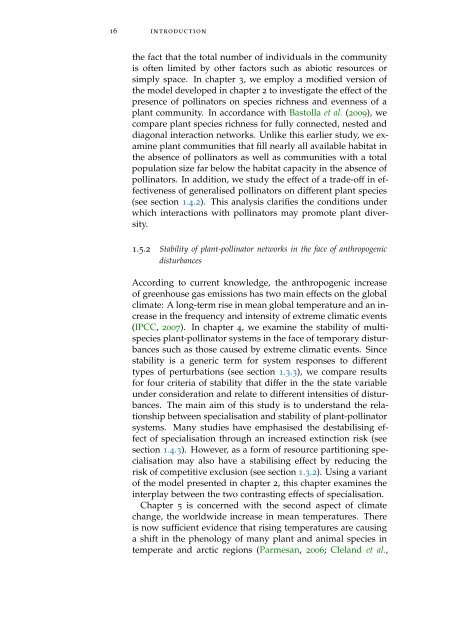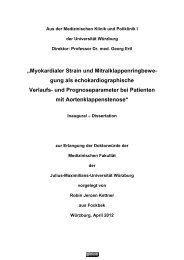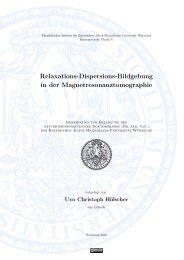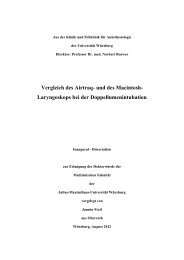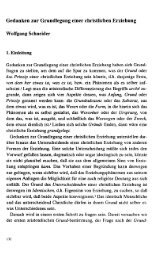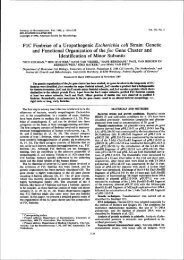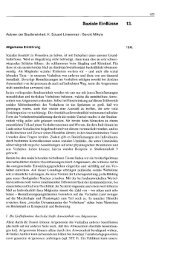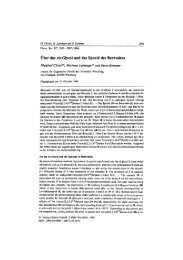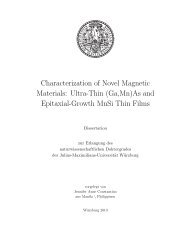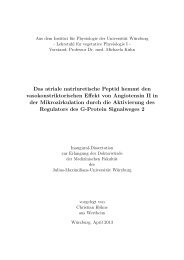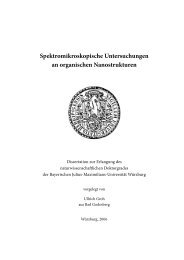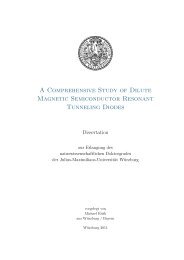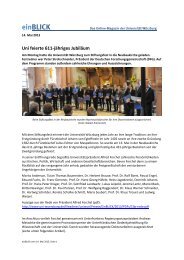Linking Specialisation and Stability of Plant ... - OPUS Würzburg
Linking Specialisation and Stability of Plant ... - OPUS Würzburg
Linking Specialisation and Stability of Plant ... - OPUS Würzburg
You also want an ePaper? Increase the reach of your titles
YUMPU automatically turns print PDFs into web optimized ePapers that Google loves.
16 introduction<br />
the fact that the total number <strong>of</strong> individuals in the community<br />
is <strong>of</strong>ten limited by other factors such as abiotic resources or<br />
simply space. In chapter 3, we employ a modified version <strong>of</strong><br />
the model developed in chapter 2 to investigate the effect <strong>of</strong> the<br />
presence <strong>of</strong> pollinators on species richness <strong>and</strong> evenness <strong>of</strong> a<br />
plant community. In accordance with Bastolla et al. (2009), we<br />
compare plant species richness for fully connected, nested <strong>and</strong><br />
diagonal interaction networks. Unlike this earlier study, we examine<br />
plant communities that fill nearly all available habitat in<br />
the absence <strong>of</strong> pollinators as well as communities with a total<br />
population size far below the habitat capacity in the absence <strong>of</strong><br />
pollinators. In addition, we study the effect <strong>of</strong> a trade-<strong>of</strong>f in effectiveness<br />
<strong>of</strong> generalised pollinators on different plant species<br />
(see section 1.4.2). This analysis clarifies the conditions under<br />
which interactions with pollinators may promote plant diversity.<br />
1.5.2 <strong>Stability</strong> <strong>of</strong> plant-pollinator networks in the face <strong>of</strong> anthropogenic<br />
disturbances<br />
According to current knowledge, the anthropogenic increase<br />
<strong>of</strong> greenhouse gas emissions has two main effects on the global<br />
climate: A long-term rise in mean global temperature <strong>and</strong> an increase<br />
in the frequency <strong>and</strong> intensity <strong>of</strong> extreme climatic events<br />
(IPCC, 2007). In chapter 4, we examine the stability <strong>of</strong> multispecies<br />
plant-pollinator systems in the face <strong>of</strong> temporary disturbances<br />
such as those caused by extreme climatic events. Since<br />
stability is a generic term for system responses to different<br />
types <strong>of</strong> perturbations (see section 1.3.3), we compare results<br />
for four criteria <strong>of</strong> stability that differ in the the state variable<br />
under consideration <strong>and</strong> relate to different intensities <strong>of</strong> disturbances.<br />
The main aim <strong>of</strong> this study is to underst<strong>and</strong> the relationship<br />
between specialisation <strong>and</strong> stability <strong>of</strong> plant-pollinator<br />
systems. Many studies have emphasised the destabilising effect<br />
<strong>of</strong> specialisation through an increased extinction risk (see<br />
section 1.4.3). However, as a form <strong>of</strong> resource partitioning specialisation<br />
may also have a stabilising effect by reducing the<br />
risk <strong>of</strong> competitive exclusion (see section 1.3.2). Using a variant<br />
<strong>of</strong> the model presented in chapter 2, this chapter examines the<br />
interplay between the two contrasting effects <strong>of</strong> specialisation.<br />
Chapter 5 is concerned with the second aspect <strong>of</strong> climate<br />
change, the worldwide increase in mean temperatures. There<br />
is now sufficient evidence that rising temperatures are causing<br />
a shift in the phenology <strong>of</strong> many plant <strong>and</strong> animal species in<br />
temperate <strong>and</strong> arctic regions (Parmesan, 2006; Clel<strong>and</strong> et al.,


